 MyDogBreeds
MyDogBreeds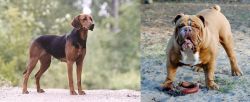 Schillerstovare is originated from Sweden but Australian Bulldog is originated from Australia. Schillerstovare may grow 11 cm / 5 inches higher than Australian Bulldog. Schillerstovare may weigh 10 kg / 22 pounds lesser than Australian Bulldog. Schillerstovare may live 3 years more than Australian Bulldog. Both Schillerstovare and Australian Bulldog has almost same litter size. Schillerstovare requires Low maintenance. But Australian Bulldog requires Moderate maintenance
Schillerstovare is originated from Sweden but Australian Bulldog is originated from Australia. Schillerstovare may grow 11 cm / 5 inches higher than Australian Bulldog. Schillerstovare may weigh 10 kg / 22 pounds lesser than Australian Bulldog. Schillerstovare may live 3 years more than Australian Bulldog. Both Schillerstovare and Australian Bulldog has almost same litter size. Schillerstovare requires Low maintenance. But Australian Bulldog requires Moderate maintenance
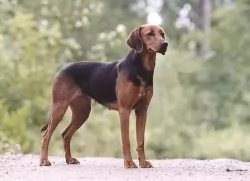 The Schillerstövare originated in Sweden, being named after a Swedish farmer, Per Schiller. After he died, the dog was named Schillerstövare in 1907, and was Sweden's first native dog breed.
The Schillerstövare originated in Sweden, being named after a Swedish farmer, Per Schiller. After he died, the dog was named Schillerstövare in 1907, and was Sweden's first native dog breed.
The Swedish Kennel Club recognised this dog in 1907 and it is also recognised by the Federation Cynologique Internationale as well as a number of minor kennels and dog clubs.
The dog has always been used as a hunting dog and the English Foxhound is the e foundation for this breed.
 The Australian Bulldog was bred from several breeds: The Bullmastiff, English bulldog, the English Staffordshire Bull Terrier and the Boxer. You will notice that his appearance is quite similar to the English bulldog, but this breed has a less-squished muzzle, fewer wrinkles and longer legs. They have great strength with a good thickness of the bone. They are solid and compact breed with good muscle tone.
The Australian Bulldog was bred from several breeds: The Bullmastiff, English bulldog, the English Staffordshire Bull Terrier and the Boxer. You will notice that his appearance is quite similar to the English bulldog, but this breed has a less-squished muzzle, fewer wrinkles and longer legs. They have great strength with a good thickness of the bone. They are solid and compact breed with good muscle tone.
The head structure of an Aussie Bulldog is one of its main attributes. It is very strong, square shaped with depth and width of muzzle less than a general bulldog. They have some wrinkle across the nose. Eyes are wide apart, large and clean. The jaw is wide and square, with strong teeth.
The name Australian Bulldog was given by Noel and Tina Green, the founders of the breed. They introduced Australian Bulldog to the public in 1998.
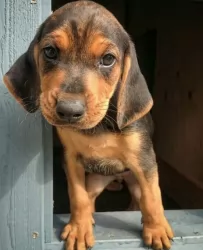 The Schillerstövare is a medium to large sized dog. They’re athletic and muscular.
The Schillerstövare is a medium to large sized dog. They’re athletic and muscular.
Standing at between 53–61cm in height and weighing in the region of 18–25kg, the coat of the dog is fairly short and harsh, with the color being black and tan.Sometimes you’ll see some white markings on the chest and paws.
The head is domed, the eyes brown, bright and alert and the ears of the dog are broad, medium length and floppy. The long tail is carried low or held out when running or alert.
If you allow your Schillerstovare to have puppies, you can expect between 3 to 7.
The Schillerstovare is a calm dog but he can get petty lively when there’s a game to be had. He gets on well with well disciplined children who have been taught to be kind and respectful to animals. He also gets on well with pets in the home. Just like with most other dogs, he will need to be trained and socialized as he is a strong willed, confident, dominant dog.
He is friendly and active but will be somewhat reserved around strangers.These dogs will require a lot of exercise and will need quite a bit of space too. They aren't well suited to small properties in the city. He will need a daily walk but also a chance to get off his leash and run free in the park. Other forms of exercise such as hikes, ball game and swimming will delight him.
 Australian bulldogs can be very good companions considering their natural loyalty. They just love to interact with humans and they are rarely aggressive.
Australian bulldogs can be very good companions considering their natural loyalty. They just love to interact with humans and they are rarely aggressive.
They can be taught to be excellent watchdogs. The perfect place to raise this breed would be a house with a yard. The Australian Bulldog is usually dominant toward other dogs in its territory but, with proper training and early socialization, you can teach them to get along with other dogs and pets.
No matter if you are an active single, or you plan to bring an Australian bulldog puppy into the big family, as long as you are caring and loving toward him, he will be an amazing pet.
The Australian Bulldog is not recommended for apartment life. But, you can teach him to live in the smaller space if you tend to respect his daily need for activity. This breed is an indoor dog, and should not be left outside all day in a kennel. The best advice is to raise them in temperate climates since they can’t bear the extreme heat or extreme cold.
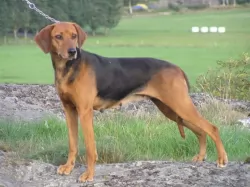 Schillerstovares are social, loving, friendly, loyal dogs who enjoy being around their human family. He’s going to need a lot of exercise, both mental and physical to keep him from boredom and frustration.
Schillerstovares are social, loving, friendly, loyal dogs who enjoy being around their human family. He’s going to need a lot of exercise, both mental and physical to keep him from boredom and frustration.
He will rely on you for at least a daily walk. He is strong-will and confident and will do well in a family where they are active and where they are firm, patient, kind and consistent in their behaviour towards him because then he ticks all th right boxes for being a splendid pet.
 Australian Bulldog is a breed that will protect their family. They are great during the playtime with children as well. If you don’t have children, make sure you socialize your dog with children while he is still young.
Australian Bulldog is a breed that will protect their family. They are great during the playtime with children as well. If you don’t have children, make sure you socialize your dog with children while he is still young.
They are extremely intelligent. You can teach you Australian Bulldog almost everything in a very short time.
early socialization is a must with the Australian Bulldog.
you should start to train your Australian Bulldog as soon as possible. Positive reinforcement-based training methods are the ones you need to master in order to raise a good Australian Bulldog. They will be trained easily if there is a firm, consistent hand in training and they need leadership role from their owners. They can be taught very easy to be obedient and they love playing games like Frisbee, catch, water activities (but they swim very rarely because of their big and heavy chests), exploring the nature.
 Even though your Schillerstovare is a healthy dog breed, hip dysplasia is a common dog disease that many dogs get.
Even though your Schillerstovare is a healthy dog breed, hip dysplasia is a common dog disease that many dogs get.
This is a skeletal disease when a dog’s hip joints become partially dislocated. It can be very difficult for your dog to get around, and he can also develop arthritis. It gets very sad when your dog doesn’t even want to participate in games anymore.
 Australian Bulldog has better health than the English bulldog and its health continues to improve with each generation.
Australian Bulldog has better health than the English bulldog and its health continues to improve with each generation.
The pushed-in face causes harder breathing. Be aware that they can’t use the air to cool itself off as quickly as necessary. During the extreme heat, Australian Bulldogs can develop heat stroke and die from it.
Take special care of the wrinkles on their nose. They will require everyday care since wrinkles need to be cleaned and kept dry to prevent the skin infection. Bath the dog only when it is necessary because of too much bathing with soap damages the natural oils in its skin.
The Australian Bulldog, on average, is fed two times a day. They have the high risk of obesity, so there is no real need for more than two meals. Make sure to choose a premium quality food and to feed the dog according to the instructions. Also, they need lots of fresh water since they will be super active pet.
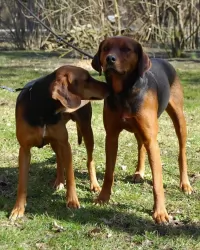 With his short coat, the Schillerstovare is considered a low maintenance dog and requires a minimal amount of grooming. Brushing should be done twice a week to remove loose hair. The harsh outer coat seems to repel dirt and dust.
With his short coat, the Schillerstovare is considered a low maintenance dog and requires a minimal amount of grooming. Brushing should be done twice a week to remove loose hair. The harsh outer coat seems to repel dirt and dust.
Trim your pet’s nails, check inside his ears for signs of redness, make sure his eyes are bright and clear and make sure he doesn’t have any unusual lumps on him.
Make sure his vaccines are up to date to avoid deadly canine diseases. Take him to the vet when you suspect he isn’t his normal self.
Dogs, just like humans, do well on good, nutritious diets. Feed a human lots of junk food and sweets and they’ll grow up to be obese and unhealthy. That's exactly how it is with dogs too. Some of the best commercially manufactured dog foods are convenient and they can be good if you look at the top brands. Look for ones that cater for your dog’s age, size, breed and activity levels. This dry kibble can be made more inviting for your pet when you include some homemade food.
Dogs just want simplicity so that they don’t battle with digestive problems. Boiled chicken, sweet potatoes, brown rice or pasta, carrots and spinach will be wonderful for him when you chop the food up and add it into the dry kibble twice a week. See his tail wag and his brown eyes light up when he smells this treat. Some raw meat added up occasionally will also contribute to your pet’s heath.
Make sure he is never without a constant supply of fresh, cool water.
 Feeding the puppy and adult: high-quality dog food for active dogs is a must. Do not overfeed them. If you are not sure about the amount of food your dog really needs, please consult a vet.
Feeding the puppy and adult: high-quality dog food for active dogs is a must. Do not overfeed them. If you are not sure about the amount of food your dog really needs, please consult a vet.
The Australian Bulldog needs minimal grooming. They should be brushed at least once a week using a firm bristled brush. They shed a moderate amount on a regular basis so there will be loose hair to deal with. Make sure to clip the nails when necessary. They will need a tooth brushing two times a week and checking and wiping its ears once a week.
Points for Good Health: every day long walks, plenty of exercises, special skin care and regular vet check-ups.